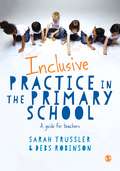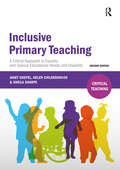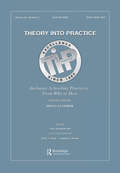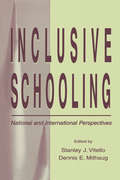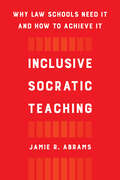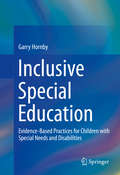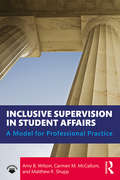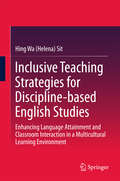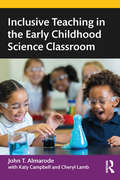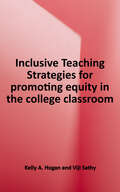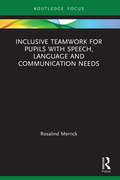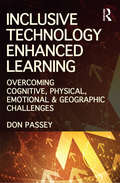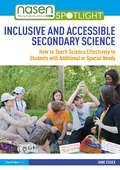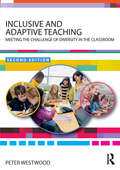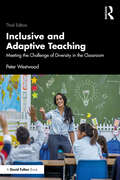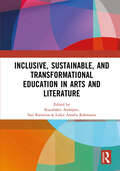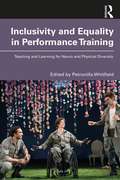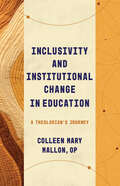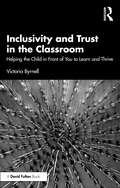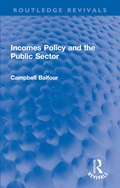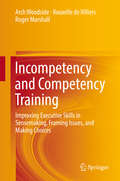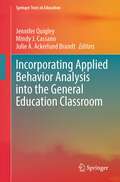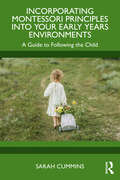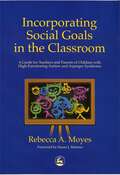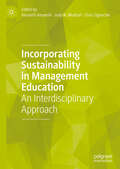- Table View
- List View
Inclusive Practice in the Primary School: A Guide for Teachers
by Sarah Trussler Debs RobinsonDo you want to feel more confident when teaching children with Special Educational Needs and Disabilities (SEND)? Would you like to be a more inclusive teacher? This book provides clear and flexible frameworks for effective inclusive teaching, and explains how to teach and plan for supporting any child’s learning, no matter what their needs are. With case studies and activities the book: explains and contextualizes current beliefs towards SEN provides models for practice encourages you to engage in thinking about SEN and inclusion offers interactive reflection points throughout links out to research with suggestions for further reading Whether you’re training to be a primary school teacher or already in the classroom this book will make you feel confident to be the inclusive teacher you need to be.
Inclusive Primary Teaching: A critical approach to equality and special educational needs and disability (Critical Teaching)
by Janet Goepel Helen Childerhouse Sheila SharpeThis is an invaluable and fully updated text on inclusive practice for all primary trainees and teachers and for those working towards the National Award SEN Co-ordination. It provides an equality- and child-centred approach to inclusion, combining both theory and practice while promoting critical thinking about the complex issues involved. Scenarios are used as the basis for unpicking major topics and provide opportunities for learning in context, while questions and reflections encourage deep thinking about key learning points. This second edition has been fully revised throughout and now includes: full reference to the new Special Educational Needs and Disability Code of Practice (2014) as well as the Children and Families Act (2014) and Behaviour2Learn two completely new chapters on understanding learners who are vulnerable and understanding learners with communication difficulties extended thinking activities and extended reflections to support M-level study an improved organisation with emphasis on the national priorities.
Inclusive Schooling Practices Tip V 45#3: FROM WHY TO HOW
by Peter V. Paul Douglas Fisher Anita Woolfolk HoyFirst published in 2006, this is volume 45, number 3, the Summer 2006 edition of Theory into Practice. This edition includes articles on 1:1 instruction, collaborative planning, comprehensive school reform and inclusive schools, classroom peer support, assumptions and additional resources for use in the classroom.
Inclusive Schooling: National and International Perspectives (Rutgers Invitational Symposium on Education Series)
by Dennis E. Mithaug Stanley J. VitelloThis book provides new information on how various inclusion policies have been implemented in different schools and school districts in North America and in a range of European countries. The purpose of inclusion policy is to prevent the marginalization of people who experience unfavorable circumstances in life. It is an approach to the education of students with disabilities that is based on a commitment to what all members of a free society deserve in order to become fully participating members--a fair chance to find a meaningful place in their own communities. This book is a kind of status report on what inclusive education has achieved and what it may achieve in the future for children and youth with disabilities. It describes the philosophical, legal, and practical terrain covered by inclusion policy in general and inclusive schooling in particular. Contributors assess inclusion policy and suggest ways to reconceptualize it, bringing to their data analysis a depth of experience and knowledge about public schooling in their respective countries. Although inclusion of students with disabilities in general education classes has been embraced by politicians and educators calling for equal opportunity in our society and is being incorporated into national and international education laws, it continues to be controversial and the debate is sometimes heated. A goal of this book is to shed some light on this debate. Is inclusion mostly about student placement? Are students with disabilities attaining social and learning membership in general classrooms? Have they benefitted from inclusion? How about students without disabilities? What have been the benefits? Must learning take second priority to socialization and friendship? Are teachers getting the training they need? How do parents feel about inclusion programs? How do students feel? What kind of curricular accommodations should be made? These and other questions are addressed. This volume is based on original papers presented by the contributing authors in October 1997 at the Rutgers Invitational Symposium on Education on Inclusive Schooling: National and International Perspectives.
Inclusive Socratic Teaching: Why Law Schools Need It and How to Achieve It
by Jamie R. AbramsFor more than fifty years, scholars have documented and critiqued the marginalizing effects of the Socratic teaching techniques that dominate law school classrooms. In spite of this, law school budgets, staffing models, and course requirements still center Socratic classrooms as the curricular core of legal education. In this clear-eyed book, law professor Jamie R. Abrams catalogs both the harms of the Socratic method and the deteriorating well-being of modern law students and lawyers, concluding that there is nothing to lose and so much to gain by reimagining Socratic teaching. Recognizing that these traditional classrooms are still necessary sites to fortify and catalyze other innovations and values in legal education, Inclusive Socratic Teaching provides concrete tips and strategies to dismantle the autocratic power and inequality that so often characterize these classrooms. A galvanizing call to action, this hands-on guide equips educators and administrators with an inclusive teaching model that reframes the Socratic classroom around teaching techniques that are student centered, skills centered, client centered, and community centered.
Inclusive Special Education
by Garry HornbyMuch has been written about special education and about inclusive education, but there have been few attempts to pull these two concepts and approaches together. This book does just that: sets special education within the context of inclusive education. It posits that to include, effectively, all children with special educational needs in schools requires an integration of both concepts, approaches, and techniques. It has never been more timely to publish a book that helps professionals who work with schools, such as psychologists, special education professionals, and counselors, to identify effective practices for children with special needs and provide guidelines for implementing these in inclusive schools.
Inclusive Supervision in Student Affairs: A Model for Professional Practice
by Amy B. Wilson Carmen M. McCallum Matthew R. ShuppInclusive Supervision in Student Affairs provides a new, action-oriented model that addresses what supervisors should do to create more inclusive environments for all staff and to help inform socially just practice. Grounded in theory and research and framed through the lens of continuous professional development and personal growth, this book helps Student Affairs professionals at all levels develop effective leadership skills that demonstrate multicultural competence. Providing a conceptual model and self-assessment tool to enhance professionals’ preparation for supervision, this book also helps readers reflect upon their own capacity to enact an inclusive supervisory approach through the use of case studies and end-of-chapter questions.
Inclusive Teaching Strategies for Discipline-based English Studies
by Hing Wa Helena SitThis book presents empirical findings that reveal various teaching strategies and responses from two sub-cultural groups of students, i. e. local Hong Kong and Mainland students, with regard to their English studies. It puts forward a constructive model for innovative teaching strategies to enhance language attainment and classroom interaction in a multicultural learning environment in Hong Kong. It highlights inclusive teaching strategies with instructional, inspirational and interactional components to accommodate diverse learners and promote their classroom interaction. In addition to contributing to innovation in higher education in Hong Kong, the lessons learned here can be universally applied to ESL/EFL teaching and education reform around the world. Further, they support better learning and teaching at universities in the context of internationalization. The book will above all benefit undergraduate students in ESL/EFL teacher training programs, and post-graduate research students in applied linguistics, language education and second language teacher education. It also offers a valuable reference book for university lectures in teacher education, researchers in higher education in China, and TESOL/TEFL instructors in English-speaking countries (the UK, USA, Canada, Australia, New Zealand etc. ).
Inclusive Teaching in the Early Childhood Science Classroom
by John T. AlmarodeFocused on engaging all students, Inclusive Teaching in the Early Childhood Science Classroom walks readers through the process of planning, developing, and implementing science instruction for early learners. Drawing on a range of pedagogical processes and approaches, this comprehensive text links science to other disciplines and explores how we develop language, social-emotional, and content learning through early childhood science. Each chapter is framed around an essential question and features success criteria and reflection tasks to guide readers through the content. Aligned with the Next Generation Science Standards and addressing the Interstate New Teacher Assessment and Support Consortium Model Core Teaching Standards, this textbook is critical reading for preservice teacher education students enrolled in an inclusive early childhood or early childhood science methods course.
Inclusive Teaching: Strategies For Promoting Equity In The College Classroom (Teaching and Learning In Higher Education Ser.)
by Kelly A. Hogan Viji SathyAward-winning teachers offer practical tips for addressing inequities in the college classroom and for making all students feel welcome and included. In a book written by and for college teachers, Kelly Hogan and Viji Sathy provide tips and advice on how to make all students feel welcome and included. They begin with a framework describing why explicit attention to structure enhances inclusiveness in both course design and interactions with and between students. Inclusive Teaching then provides practical ways to include more voices in a series of contexts: when giving instructions for group work and class activities, holding office hours, communicating with students, and more. The authors finish with an opportunity for the reader to reflect on what evidence to include in a teaching dossier that demonstrates inclusive practices. The work of two highly regarded specialists who have delivered over a hundred workshops on inclusive pedagogy and who contribute frequently to public conversations on the topic, Inclusive Teaching distills state-of-the-art guidance on addressing privilege and implicit bias in the college classroom. It seeks to provide a framework for individuals and communities to ask, Who is being left behind and what can teachers do to add more structure?
Inclusive Teamwork for Pupils with Speech, Language and Communication Needs (Routledge Research in Special Educational Needs)
by Rosalind MerrickThis book provides a rationale for teaching inclusive teamwork and for understanding communication as a collective endeavour. It shows how teamwork can be taught within schools and emphasises the role that classmates have in facilitating good communication, particularly in the face of difficulty. Grounded in evidence from hours of therapy and analysis of children’s accounts of communication and children’s interactions with their peers, the book explores the components of teamwork by looking carefully at the way schoolchildren really interact. It draws on research from the fields of education, psychology and speech and language therapy to propose the framework for a programme suitable for children aged 7 to 14 years, designed to include pupils with speech, language and communication needs. The programme includes activities, a set of criteria to use as an outcome measure and examples of the way that children and young people have responded in practice. In using the inclusive teamwork programme outlined in this book, teachers have the potential to support all children in developing rapport, effective communication and problem-solving skills. Providing a framework designed to meet the needs of all learners, this book will be highly relevant reading for students of education, speech and language therapy and educational psychology, as well as speech and language therapists and practitioners in the field of education.
Inclusive Technology Enhanced Learning: Overcoming Cognitive, Physical, Emotional, and Geographic Challenges
by Don PasseyInclusive Technology Enhanced Learning draws together a remarkable breadth of research findings from across the field, providing useful data on the power of technology to solve cognitive, physical, emotional or geographic challenges in education. A far-ranging assessment, this book combines research, policy, and practical evidence to show what digital technologies work best for which learners and why. Inclusive Technology Enhanced Learning takes a number of unique perspectives, looking at uses of digital technologies through a detailed learning framework; considering different groups of users and how they can be individually supported through digital technologies; and exploring how those who support different categories of learners can apply technologies to their specific support needs. This powerful meta-analysis of research on technology enhanced learning will be invaluable reading for anyone concerned with the impacts of digital technologies on learning across subject areas, age ranges, and levels of ability.
Inclusive and Accessible Secondary Science: How to Teach Science Effectively to Students with Additional or Special Needs (nasen spotlight)
by Jane EssexDrawing on extensive professional experience and detailed empirical evidence, this resource sets out an insightful, highly practical approach to teaching science to secondary-aged students with learning difficulties and other special educational or additional support needs (SEND/ASN). The book explores the barriers that the secondary school science curriculum currently presents to those who do not learn in the expected way, before providing a wealth of practical strategies to help teachers, in both specialist and mainstream settings, to make science more accessible. Multiple science topics are covered in depth, including living and non-living matter, the periodic table, electrical energy, the solar system, the environment and more. Each topic is supported by extensive teachers’ notes outlining activities that will allow educational practitioners to enact the principles of accessibility in the classroom. With rich field notes and practical takeaways included to accompany key insights, this accessible book will provide science teachers at the secondary school level, as well as support staff and anyone aspiring to teach science to SEN/ASN learners, with the guidance and resources they need to make science education meaningfully inclusive.
Inclusive and Adaptive Teaching: Meeting the Challenge of Diversity in the Classroom
by Peter WestwoodFrom bestselling author Peter Westwood, this new edition of Inclusive and Adaptive Teaching provides a considered approach to meeting the ongoing challenge of inclusive teaching in the classroom and offers a range of strategies for good practice. This comprehensive resource promotes a fully inclusive approach to teaching and outlines the necessary adaptations and accommodations that are often required in order to address the needs of the very diverse population of students now to be found in most classrooms. Drawing on the ever-evolving practices of inclusive education and research into learning theories, Westwood describes useful, evidence-based strategies for adapting curriculum content, learning activities, assessment and resource materials. Fully updated to reflect cutting-edge international research and teaching practices, this new edition gives additional focus to the role of digital technology, differentiation, the teaching of STEM subjects and support for inclusivity in higher education. Accessible chapters in this new edition present: principles, aims and issues in providing inclusive schooling; sound pedagogical practices for adapting curriculum content; evidence-based methods for teaching mixed-ability classes; ideas for designing and modifying teaching materials; ways of implementing inclusive assessment of learning. Each chapter contains an up-to-date list of online and print resources easily available to teachers who wish to pursue topics in greater depth. This is an invaluable resource for both practising and trainee teachers and teaching assistants, as well as school principals, school counsellors and educational psychologists.
Inclusive and Adaptive Teaching: Meeting the Challenge of Diversity in the Classroom
by Peter WestwoodThis new edition of Inclusive and Adaptive Teaching from bestselling author Peter Westwood continues to provide a range of practical strategies for advancing the learning and development of all students in inclusive classrooms. Drawing on the most recent international research into teaching methods, Westwood presents a range of evidence-based strategies for adapting curriculum content, modifying learning activities and resources, and for making any necessary accommodations during assessment. Revised topics in this third edition include a focus on the implications of diversity and exceptionality, the progress made to date in providing inclusive schooling, a presentation of evidence-based methods for teaching mixed-ability classes and ideas for adapting the curriculum and designing teaching materials. New topics in this revised edition include: • how to support students’ self-determination and autonomy; • LGBTQ+ issues for inclusive schools; • the UK ‘engagement model’ for assessing very low-functioning children; • the concept and purposes of a ‘flipped classroom’; • engaging with a Response-to-Intervention Model; • how to support students in vocational colleges and universities. Each chapter contains an up-to-date list of online and print resources available to teachers who wish to pursue topics in greater depth. This text is an invaluable resource for both practicing and trainee teachers and teaching assistants, as well as school principals, school counsellors and educational psychologists.
Inclusive, Sustainable, and Transformational Education in Arts and Literature: Proceedings of the 7th International Seminar on Language, Education, and Culture, (ISoLEC, 2023), July 07—08, 2023, Malang, Indonesia
by Sari Karmina Kusubakti Andajani Lidya Amalia RahmaniaThis book contains the proceedings of The International Seminar on Language, Education, and Culture (ISoLEC) 2023, an annual conference hosted by the Faculty of Letters, Universitas Negeri Malang. With the theme, Inclusive, Sustainable, and Transformational Education in Arts and Literature, ISoLEC aims to address key issues such as inclusive education in language, arts, and culture, sustainable education in language, arts, and culture, post-pandemic teaching and learning practices, corpus-based language, teaching and research, language in media, gender and identity, pop contemporary and digital culture, culture and spirituality, multilingualism and translanguaging, visual and performing arts, oral tradition and local culture, and digital literacy and information science. This book is a collection of selected articles that were presented at the conference covering issues of arts, language, and cultures. This conference addressed a range of relevant topics including:· Inclusive Education in Language, Arts, & Culture· Sustainable Education in Language, Arts, & Culture· Post Pandemic Teaching and Learning Practices· Corpus-Based Language, Teaching and Research· Language in Media· Gender and Identity· Pop, Contemporary and Digital Culture· Culture and Spirituality· Multilingualism and Translanguaging· Visual and Performing Arts· Oral Tradition & Local Culture· Digital Literacy and Information ScienceThis proceeding will be of interest to students, lecturers, teachers, and academics who are interested in developing their knowledge in the field of language, education, and culture. Specifically, this book will be an interesting read for those who want to reimagine the inclusive and sustainable education.
Inclusivity and Equality in Performance Training: Teaching and Learning for Neuro and Physical Diversity
by Petronilla WhitfieldInclusivity and Equality in Performance Training focuses on neuro and physical difference and dis/ability in the teaching of performance and associated studies. It offers 19 practitioners’ research-based teaching strategies, aimed to enhance equality of opportunity and individual abilities in performance education. Challenging ableist models of teaching, the 16 chapters address the barriers that can undermine those with dis/ability or difference, highlighting how equality of opportunity can increase innovation and enrich the creative work. Key features include: Descriptions of teaching interventions, research, and exploratory practice to identify and support the needs and abilities of the individual with dis/ability or difference Experiences of practitioners working with professional actors with dis/ability or difference, with a dissemination of methods to enable the actors A critical analysis of pedagogy in performance training environments; how neuro and physical diversity are positioned within the cultural contexts and practices Equitable teaching and learning practices for individuals in a variety of areas, such as: dyslexia, dyspraxia, visual or hearing impairment, learning and physical dis/abilities, wheelchair users, aphantasia, attention-deficit/hyperactivity disorder and autistic spectrum. The chapter contents originate from practitioners in the UK, USA and Australia working in actor training conservatoires, drama university courses, youth training groups and professional performance, encompassing a range of specialist fields, such as voice, movement, acting, Shakespeare, digital technology, contemporary live art and creative writing. Inclusivity and Equality in Performance Training is a vital resource for teachers, directors, performers, researchers and students who have an interest in investigatory practice towards developing emancipatory pedagogies within performance education.
Inclusivity and Institutional Change in Education: A Theologian's Journey (Theological Education between the Times (TEBT))
by Colleen Mary MallonDo you want to implement diversity, equity, and inclusion initiatives at your institution, but you don&’t know where to start? In the wake of the murder of George Floyd, a small Catholic secondary school erupted in controversy. Students and alumni took to social media to share stories of their own experiences with racism on campus. It was clear that the school&’s culture needed to change. Enter Sr. Colleen Mary Mallon, who joined the high school as the director of mission formation. Pursuing grassroots institutional reform, Sr. Colleen found a new meaning of theological education. In this candid volume, Sr. Colleen reflects on the challenges of molding her Dominican school to embody its charism of veritas. This commitment to truth required her school and her Dominican sisters to recognize their complicity in white supremacy and to center the concerns of marginalized communities. Educating faculty, staff, administrators, and parents in Catholic Social Teaching equipped them to bring their actions—and the culture of the school—into alignment with their professed values. Sr. Colleen&’s story offers one example of how schools can implement antiracist and antibias reforms. With its wealth of practical insights and discussion questions, Inclusivity and Institutional Change in Education will guide readers in effecting cultural change in their own institutions.
Inclusivity and Trust in the Classroom: Helping the Child in Front of You to Learn and Thrive
by Victoria ByrnellDrawing from a wealth of specialist and mainstream school experience, this book intelligently synthesises ground-breaking research on teacher–student trust and learning to present innovative approaches to inclusive practice relevant to practitioners at all levels. Relational trust has critical implications for student engagement and learning, and new findings contribute insightfully to teacher approaches which are invaluable for practitioners at any stage of their career. The components of relational trust are clearly explained in this essential resource. Each theme is accompanied by a range of useful strategies which enable practitioners to deploy trust theory to develop a more sustainable education system. This thoughtful approach has the potential to shift educational priorities and advance equitable access to education for all students.
Incomes Policy and the Public Sector (Routledge Revivals)
by Campbell BalfourOriginally published in 1972, Incomes Policy and the Public Sector is a consideration of the work conducted by The National Board for Prices and Incomes from 1965 to 1970. The Board, commonly known as the PIB, was intended to be the instrument through which an incomes policy could be shaped and guided in Britain. This book looks first at the reports that it made, and the criteria and judgements used, and then examines incomes policy by studying its impact in several areas in the public sector. Incomes Policy and the Public Sector offers a comprehensive overview of incomes policy from 1965-1970 and puts the reader in touch with ‘real economic situations’.
Incompetency and Competency Training
by Roger Marshall Arch Woodside Rouxelle De VilliersThis book covers theory and practice of competency and incompetency training. 'Incompetency training' includes formal and informal instruction that consciously (purposively) or unconsciously imparts knowledge, attitudes, beliefs, and behavior (including procedures) that are useless, inaccurate, misleading, and/or will lower performance outcomes of the trainee versus no training or training using alternative training methods. This book offers an early workbench model of incompetency training theory which proposes that executives and associates in firms, academia, and government organizations consciously as well as unknowingly offer incompetency training in many contexts. The evidence so far has shown that increasing trainees' vigilance and ability to recognize exposure to incompetency-training may help trainees to decrease the effectiveness (impact) of exposures to incompetency training--advancing incompetency training theory and knowledge of incompetency training practice may be necessary conditions for remedying negative outcomes that follow from trainees receiving such training. The book uses a series of laboratory experiments to elicit on tools advocated in the literature as aids in increasing incompetency and/or competency, and provides a comprehensive review of the literature on (in)competency training.
Incorporating Applied Behavior Analysis into the General Education Classroom (Springer Texts in Education)
by Jennifer Quigley Mindy J. Cassano Julie A. Ackerlund BrandtThis user-friendly textbook addresses the relevance of Applied Behavior Analysis (ABA) within the general education setting. Oftentimes, ABA is thought of as only applicable to those with autism spectrum disorder and other developmental disorders. In contrast, the application of ABA principles is appropriate for any socially significant problem, such as those that arise daily in the general education setting. This book will help educators, through individual and group interventions, decrease maladaptive behavior in their classrooms and to increase the focus on the curriculum.This book not only summarizes the basics of ABA technologies and methodologies but provides readers with: • Materials tailored to be used with any student by general education practitioners, teachers, and clinicians• Specific examples to ease the application of these technologies and curriculums• Templates to be individualized to each reader’s needs• A focus on the functionality and applicability of these programs Written in layman’s terms and broken down into categories of basic concepts and school-wide implementation, general educators will not only learn about ABA applications in education but will have clear examples of how to bridge the gap between understanding and application.
Incorporating Montessori Principles into Your Early Years Environments: A Guide to Following the Child
by Sarah CumminsIncorporating Montessori Principles into Your Early Years Environments will allow readers to understand the developing child in their early years setting and how to adapt a Montessori approach to meet their pupils’ needs. This book shares an insight into Maria Montessori’s extensive research, observations, and findings about child development and education, enabling them to transfer these to their own setting. Based on the scientific observation of the child and the stages of development they go through, Montessori pedagogy can be successfully applied in any setting and is well-known for its child-centred, holistic, and individualised approach to education. By addressing its key principles such as respect for the child, prepared environment, and the role of the adult, chapters highlight the overarching vision Montessori’s approach had and explore how and why it can still be so meaningful in today’s early years classrooms. This book will allow the reader to reflect on the framework they work with and offer examples of adapted practice as well as highlighting the importance of knowing the children, observing their work, and planning suitable resources and activities that will nurture their development. This is an essential reading for trainee Montessori teachers, trainee educators, early childhood professionals, and childminders, empowering them to enhance learning and development for their pupils, whilst instilling love and respect throughout their interactions with them.
Incorporating Social Goals in the Classroom: A Guide for Teachers and Parents of Children with High-Functioning Autism and Asperger Syndrome
by Susan J. Moreno Rebecca MoyesThis book provides practical, hands-on strategies to teach social skills to children with high-functioning autism and Asperger Syndrome. It includes a detailed description of the social deficits of these children as they appear in the classroom - difficulties with such things as understanding idioms, taking turns in conversation, understanding and using tone of voice and body language - and ways to address them. Instruction is included in the book to enhance the development of appropriate, measurable, and meaningful individualized education plans (IEPs) to incorporate social goals. Lesson plans are included to facilitate the ability to 'teach' these social goals. Parents will find this text an excellent training tool to help develop social education curriculums for their children, and teachers will find it particularly helpful as an easy-to-read manual containing many 'nuts and bolts' strategies to utilize in the classroom.
Incorporating Sustainability in Management Education: An Interdisciplinary Approach
by Kenneth Amaeshi Judy N. Muthuri Chris OgbechieResponding to the pressing need of business schools to incorporate sustainability thinking into their curricula, this new book offers fresh thinking on how to achieve this in practical terms. Structured on a typical MBA programme, each chapter explores how sustainability thinking can be integrated into existing subject areas. Rather than being prescriptive, the chapters provide opportunities to reflect on successes as well as challenges associated with embedding sustainability into MBA courses. Contributors explore the employability implications of sustainability and how these are reflected in course designs, pedagogy and assessments. Filling an important gap in current literature, Incorporating Sustainability in Management Education provides important support to Higher Education Institutes who must quickly adapt to this desired change in business school curricula.
